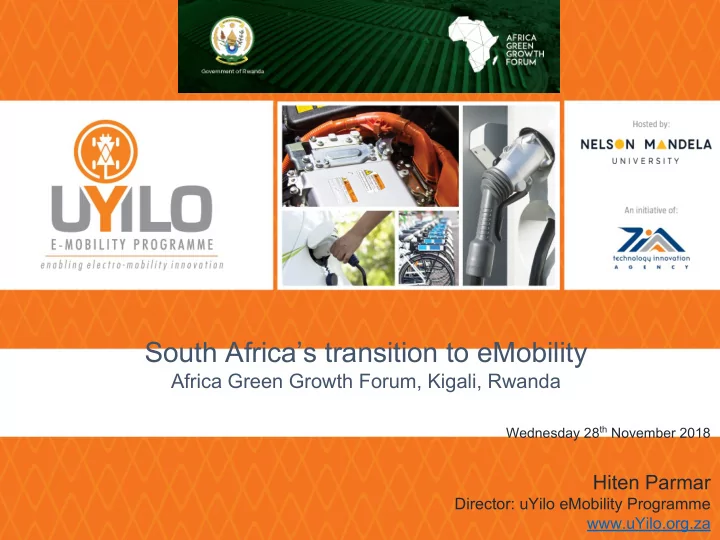

South Africa’s transition to eMobility Africa Green Growth Forum, Kigali, Rwanda Wednesday 28 th November 2018 Hiten Parmar Director: uYilo eMobility Programme www.uYilo.org.za
Cumulative Global Passenger Electric Vehicle Sales ➢ 1 st million took 60 months (5 years) ➢ 2 nd million took 17 months (1.4 years) ➢ 3 rd million took 10 months ➢ 4 th million took 6 months How fast will we reach the 5 th million ? . . . World Top Polluting Cities (South Africa)
Electrification of all Segments of Transportation Source: IDTechEx Source: FutureTransport
Electric Vehicle Infrastructure Versatility Public Transport Vehicle-to-Grid - Energy Market Resilient Smart-Grid Infrastructure
Circular Economy - eWaste of Batteries Source: Schaufenster Elektromobilit ä t Reuse • Source: Nissan Using EV battery packs for grid storage application Refabricate • Involves dismantling the EV battery packs, assessing each cell, then remanufacturing a reconditioned battery pack Recycling • Actual recycling of cell chemistry
Local Government Pledges Globally Source: IEA
South Africa’s Landscape - Electrified Vehicles Hybrid Electric Vehicles (HEV) (2017) Charging Infrastructure Plug-in Hybrid Electric Vehicles (PHEV) (2017) Battery Electric Vehicles (BEV) (2017) Source: LightstoneAuto
South Africa’s Customs & Excise Taxation Structure (PV) Automotive sector is one of the largest manufacturing sectors in the SA economy (Approx. 601,000 vehicles produced in 2017) OEM Employment Levels: 30,000 Additional fuel quality challenges to progress to lower emissions Supplier Employment Level: 80,000
Sustainable Transport Showcases in South Africa
SA 2030 National Development Plan Extracts Milestones: •Broadening access to employment •Establish effective , safe and affordable public transport •Reduce carbon emissions •Boost competitiveness and exports •Public infrastructure investment focused on transport , energy and water •Establish a competitive base of infrastructure , human resources and regulatory frameworks •Ensure environmental sustainability and resilience Critical Actions: •The green economy agenda will be leveraged to promote deeper industrialisation, energy efficiency and employment •Building sustainable communities : Reducing the carbon footprint and economic costs of transport •Over the short term, policy needs to respond quickly and effectively to protect the natural environment and mitigate the effects of climate change
South Africa’s Legislation Targets #GreenMobility • Dept. of Energy: Energy Strategic Plan • Dept. of Science & Technology: 10 Year Innovation Plan • Dep. of Transport: Green Transport Strategy • Dept. of Environmental Affairs: National Climate Change Response Strategy • National Energy Efficiency Strategy • Industrial Policy Action Plan • Integrated Resource Plan
Green Transport Strategy 2050 Cabinet Approved August 2018 •Transport sector has been identified as the fastest growing source of greenhouse gas emissions •Direct emissions from road transport account for 91,2% of emissions within the transport sector Strategic Objectives: •Promoting the development of an efficient integrated transport system to enable socio-economic development •Achieve modal shifts in the transport sector that reduce green-house gases , congestion and economic efficiency •Reduce fossil-fuel related emissions in the transport sector •Promote the use of electric vehicles and environmentally sustainable low carbon fuels •Promote strategies for delivering transport infrastructure and integrated transit planning that builds climate resilience
Frameworks towards adoption of eMobility • Development of adequate policy packages - Subsidies (Financial and non-financial considerations) - Taxes - Regulations • Establishment of localised pilot projects • Strategies to finance the transformation towards electric mobility • Technology localisation and industrialisation initiatives • Skills, Women and Youth Development Africa’s opportunities for promising eMobility solutions
Thank You * Murakoze * Merci * Asante Sana www.uYilo.org.za National programme to serve as a multi-stakeholder, collaborative programme focused on enabling , facilitating and mobilising the electric mobility ecosystem growth within the green economy sector
Recommend
More recommend